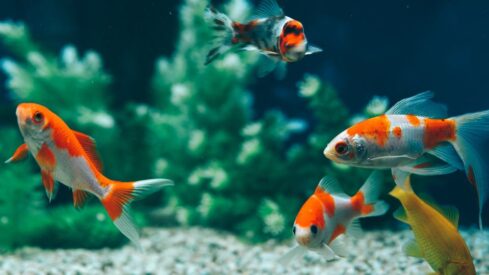Diving into over-the-counter antibiotic use in fish

In tackling the issue of irresponsible antimicrobial use, collaboration is necessary – including from the aquatic pet industry.
The practice of purchasing antibiotics online without a prescription (over-the-counter) for human consumption has been widely documented. However, this issue also extends to animal medicines. In many areas, including the US, the aquatic pet industry provides access to a range of over-the-counter treatments, some of which include antibiotics.
A sharp warning
In December 2023, the US Food and Drugs Administration (FDA) warned 9 companies in the US for potentially breaching federal law by selling unapproved and misbranded animal antimicrobial drugs without needing a prescription from a licensed veterinarian.
The related drugs were marketed towards minor pet species such as fish, and are important for human medicine. They include major antibiotics such as penicillin and erythromycin.
All approved animal products containing these drugs should, legally, only be obtained via a prescription from a qualified veterinarian – i.e., should never be sold ‘over- the-counter’ in pet stores or online. The stated products had also not gone through the main legal pathways to reach manufacture for marketing, which means that both their safety and efficacy were unknown.
The FDA warned that a failure to act upon these warnings may result in further action such as injunctions to prevent further manufacture and marketing. However, it’s uncertain how other pet fish antibiotics – those not crucial to human medicine – will be regulated.
Why are unregulated sales a concern?
In the US, unlike for dogs and cats, the acquisition of antibiotics for fish (or other aquatic animals) does not always require a prescription. Customers often buy multiple types, which they use sequentially or in combination under minimal instruction.
Given that, according to statistics from the American Pet Products Association (APPA), some 13.3 million households in the US own pet fish, this constitutes a significant market. In contrast, the UK market for ornamental (pet) fish comprises 7 million indoor fish tanks (15% of the population).
Using non-prescribed medicines in pets can have huge effects on both human and animal health for a large variety of reasons. Unregulated use of drugs such as antibiotics can negatively impact the animals’ health directly, or indirectly, by affecting the biological filter and ecosystem that sustains the quality of water in which they live.
Without veterinary consultation, ineffective treatment may occur if the correct drug, dosage, or duration of treatment for the correct condition is not followed. Similarly, errors in dosing and application can even lead to significant ill-effect and harm to animal welfare. It’s also common for illegally manufactured drugs to lack active ingredients altogether, contain harmful substances, or have mislabeled ingredients or dosages.
Antibiotic resistance is a significant concern whenever antibiotics are used inappropriately, as resistant bacteria are naturally selected, posing risks to both animal and human health. Increased antibiotic use creates more opportunities for the selection of resistant bacteria, emphasizing the importance of using these drugs only under veterinary guidance.
Moreover, a 2020 study showed that people often use unprescribed animal antibiotics for themselves, as seen in online traffic for reviews related to human use, compared to those that are related to pet use. This may have negative repercussions for users.
Exploring market drivers
One may wonder, what factors are fueling this illegal trade in veterinary medicine? Understanding the causes is often helpful in tackling the effects.
Affordability, convenience of online orders, and limited understanding of antibiotic usage due to level of education or access to reliable information, could all be contributing factors. The anonymity of online transactions and lack of accountability may also make this option more appealing to some. Furthermore, ignorance regarding the illegal nature of the trade cannot be disregarded.
This market stays active because it’s easy to make new websites without losing customers if one gets closed. Alternatively, business is maintained by having multiple online platforms supporting a particular merchant or business.
Pet owners accessing such illegal drugs face relatively low legal penalties, and the distribution of small postal packages, compared to larger shipments, largely evades detection.
Regulatory gaps that allow the use of these drugs without a prescription also sustain such behavior. In the US, antibiotic usage is regulated by the FDA and the US Department of Agriculture in larger species such as food-producing animals. However, ornamental fish aren’t regulated by these authorities, which creates a loophole.
A call to action
The growth of e-commerce facilitates the growth of the illegal veterinary medicine market through online pharmacies, online marketplaces, and social media.
However, the difficulty in gaining an accurate picture of the scale of this problem, and the scarcity of up-to- date literature regarding the illegal trade of veterinary medicines, indicates the need for additional research in this area.
The UK has a 5-year national action plan, scheduled to conclude in 2024, aimed at combating antimicrobial resistance. As part of its pledge, the UK intends to conduct additional research into the unlawful sale of antimicrobial products within the country and to shut down websites involved in unlawful online sales.
This applies to both human and veterinary medicine, including pet aquatic animals. However it appears that with respect to animals more resources are directed towards prioritizing this issue with food-producing animals and other companion animals such as cats, dogs and horses that require regular veterinary treatment.
Dealing with these issues requires a multi-faceted approach involving collaboration between the public and private sectors to close regulatory gaps, along with increased awareness of the negative effects of supporting such illegal markets.
